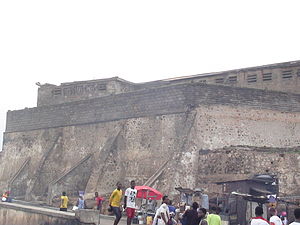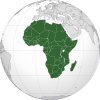Droits de l'homme au Ghana
Les droits de l'homme sont un concept selon lequel tout être humain possède des droits et des libertés. Les partisans de ce concept affirment généralement que ce sont des droits inaliénables peu importe le droit positif (droit en vigueur), l'ethnie, la nationalité ou la religion et sont acquis par le simple fait d'être humain[1].
Le Ghana est un pays d'Afrique de l'Ouest. C'était une colonie britannique jusqu'au 6 mars 1957, date à laquelle il est devenu le premier pays du sud du Sahara à obtenir son indépendance.
Droits LGBT
Les personnes LGBT au Ghana sont fortement réprimées, même si la législation héritée de l’ère coloniale ne pénalise que la sodomie, pas l'homosexualité elle-même[2]. Les scènes de violences contre les personnes homosexuelles sont courantes et souvent encouragées par les médias, les chefs religieux et le corps politique. Il est courant que des jeunes homosexuels soient expulsés de leur domicile. La Constitution est censée garantir la liberté d'expression et de réunion aux citoyens ghanéens, cependant, ces droits fondamentaux sont refusés aux personnes LGBT, en particulier aux personnes homosexuelles[3].
L'association Rights Ghana, créée en 2018, cherche à faire bouger les lignes, mais elle la cible des forces de l’ordre et des lobbies religieux chrétiens et musulmans conservateurs[2].
Liberté de religion
Liberté de la presse
Bien que la constitution inclue la liberté d'expression et de presse, le gouvernement restreint parfois ces droits. Des journalistes sont arrêtés et retenus par la police du fait de ces transgressions.[4] C'est pour cela que certains journalistes pratiquent l'autocensure. La Constitution interdit toute ingérence arbitraire dans la vie privée, la famille, le domicile ou les correspondances. Dans la pratique, le gouvernement respecte ces interdictions.[5]
En 2002, le gouvernement a censuré la médiatisation sur internet des violences tribales dans le nord du Ghana.
Conditions carcérales

En 2013, l'ONU a qualifié les conditions insalubres, la mauvaise alimentation et la surpopulation carcérale du Ghana comme un « traitement cruel, inhumain et dégradant »[7]. L'ampleur de la surpopulation carcérale est estimée comme étant plus élevée que les chiffres officiels. Les prisons utilisent un système où des détenus nommés « blouses noires » fouettent d'autres détenus avec des cannes lorsqu'ils se conduisent mal.
Situation historique
La tableau ci-dessous montre les notes accordées au Ghana depuis 1972 dans les rapports Freedom in the World, publiés chaque année par Freedom House. Noté de 1 à 7 avec 1 pour « le plus libre » et 7 pour « le moins libre »[8].
| Année | Droits civiques | Libertés publiques | État | Président[2 1] |
| 1972 | 6 | 6 | Non Libre | Kofi Abrefa Busia |
| 1973 | 7 | 6 | Non Libre | Ignatius Kutu Acheampong |
| 1974 | 7 | 5 | Non Libre | Ignatius Kutu Acheampong |
| 1975 | 7 | 5 | Non Libre | Ignatius Kutu Acheampong |
| 1976 | 7 | 5 | Non Libre | Ignatius Kutu Acheampong |
| 1977 | 6 | 5 | Partiellement Libre | Ignatius Kutu Acheampong |
| 1978 | 5 | 4 | Partiellement Libre | Ignatius Kutu Acheampong |
| 1979 | 4 | 4 | Partiellement Libre | Fred Akuffo |
| 1980 | 2 | 3 | Libre | Hilla Limann |
| 1981 | 6 | 5 | Non Libre | Hilla Limann |
| 1982 | 6 | 5 | Non Libre | Jerry Rawlings |
| 1983 | 6 | 5 | Non Libre | Jerry Rawlings |
| 1984 | 7 | 6 | Non Libre | Jerry Rawlings |
| 1985 | 7 | 6 | Non Libre | Jerry Rawlings |
| 1986 | 7 | 6 | Non Libre | Jerry Rawlings |
| 1987 | 7 | 6 | Non Libre | Jerry Rawlings |
| 1988 | 6 | 6 | Non Libre | Jerry Rawlings |
| 1989 | 6 | 5 | Non Libre | Jerry Rawlings |
| 1990 | 6 | 5 | Non Libre | Jerry Rawlings |
| 1991 | 6 | 6 | Non Libre | Jerry Rawlings |
| 1992 | 5 | 5 | Partiellement Libre | Jerry Rawlings |
| 1993 | 5 | 4 | Partiellement Libre | Jerry Rawlings |
| 1994 | 5 | 4 | Partiellement Libre | Jerry Rawlings |
| 1995 | 4 | 4 | Partiellement Libre | Jerry Rawlings |
| 1996 | 3 | 4 | Partiellement Libre | Jerry Rawlings |
| 1997 | 3 | 3 | Partiellement Libre | Jerry Rawlings |
| 1998 | 3 | 3 | Partiellement Libre | Jerry Rawlings |
| 1999 | 3 | 3 | Partiellement Libre | Jerry Rawlings |
| 2000 | 2 | 3 | Libre | Jerry Rawlings |
| 2001 | 2 | 3 | Libre | Jerry Rawlings |
| 2002 | 2 | 3 | Libre | John Kufuor |
| 2003 | 2 | 2 | Libre | John Kufuor |
| 2004 | 2 | 2 | Libre | John Kufuor |
| 2005 | 1 | 2 | Libre | John Kufuor |
| 2006 | 1 | 2 | Libre | John Kufuor |
| 2007 | 1 | 2 | Libre | John Kufuor |
| 2008 | 1 | 2 | Libre | John Kufuor |
| 2009 | 1 | 2 | Libre | John Kufuor |
| 2010 | 1 | 2 | Libre | John Atta Mills |
| 2011 | 1 | 2 | Libre | John Atta Mills |
| 2012 | 1 | 2 | Libre | John Atta Mills |
| 2013 | 1 | 2 | Libre | John Dramani Mahama |
Traités internationaux
Les différentes positions du Ghana par rapport aux différents traités internationaux relatifs aux droits de l'Homme sont les suivantes :
Notes
- 1. a. Notez que « l'année » signifie « l'année couverte ». Par conséquent, les informations pour l'année 2008 sont extraites du rapport publié en 2009, etc.
- 2. b. Au 1er janvier.
- 3. c. Le rapport de 1982 couvre l'année 1981 et le premier semestre de 1982, et le rapport de 1984 suivant couvre le deuxième semestre de 1982 et l'ensemble de 1983. Dans un souci de simplicité, ces deux rapports aberrants « d'un an et demi » ont été divisés en rapports de trois ans par interpolation.
Notes et références
- David Feldman, Civil liberties and human rights in England and Wales, Oxford, Clarendon Press, (ISBN 978-0-19-876232-4, lire en ligne), 5
- « Le Ghana confronté à une vague d’homophobie inédite », Le Monde.fr, (lire en ligne, consulté le )
- (en) Solace Brothers Foundation, « Human Rights Violations Against Lesbian, Gay, Bisexual, and Transgender (LGBT) People in Ghana: A Shadow Report », Session of the Human Rights Committee, (lire en ligne)
- (en-US) « Ghana », U.S. Department of State, (lire en ligne, consulté le )
- "Ghana", Country Reports on Human Rights Practices for 2012, Bureau of Democracy, Human Rights, and Labor, U.S. Department of State, 25 March 2013. Retrieved 14 February 2014.
- « UN official: Ghana jails cruel and inhuman » [archive du ], www.prisonministryghana.org (consulté le )
- « Ghana Prison Conditions »
- Freedom House, « Country ratings and status, FIW 1973-2012 » [xls], (consulté le )
- United Nations, « United Nations Treaty Collection: Chapter IV: Human Rights: 1. Convention on the Prevention and Punishment of the Crime of Genocide. Paris, 9 December 1948 » [archive du ] (consulté le )
- United Nations, « United Nations Treaty Collection: Chapter IV: Human Rights: 2. International Convention on the Elimination of All Forms of Racial Discrimination. New York, 7 March 1966 » [archive du ] (consulté le )
- United Nations, « United Nations Treaty Collection: Chapter IV: Human Rights: 3. International Covenant on Economic, Social and Cultural Rights. New York, 16 December 1966 » [archive du ] (consulté le )
- United Nations, « United Nations Treaty Collection: Chapter IV: Human Rights: 4. International Covenant on Civil and Political Rights. New York, 16 December 1966 » [archive du ] (consulté le )
- United Nations, « United Nations Treaty Collection: Chapter IV: Human Rights: 5. Optional Protocol to the International Covenant on Civil and Political Rights. New York, 16 December 1966 » (consulté le )
- United Nations, « United Nations Treaty Collection: Chapter IV: Human Rights: 6. Convention on the non-applicability of statutory limitations to war crimes and crimes against humanity. New York, 26 November 1968 » (consulté le )
- United Nations, « United Nations Treaty Collection: Chapter IV: Human Rights: 7. International Convention on the Suppression and Punishment of the Crime of Apartheid. New York, 30 November 1973 » [archive du ] (consulté le )
- United Nations, « United Nations Treaty Collection: Chapter IV: Human Rights: 8. Convention on the Elimination of All Forms of Discrimination against Women. New York, 18 December 1979 » [archive du ] (consulté le )
- United Nations, « United Nations Treaty Collection: Chapter IV: Human Rights: 9. Convention against Torture and Other Cruel, Inhuman or Degrading Treatment or Punishment. New York, 10 December 1984 » [archive du ] (consulté le )
- United Nations, « United Nations Treaty Collection: Chapter IV: Human Rights: 11. Convention on the Rights of the Child. New York, 20 November 1989 » [archive du ] (consulté le )
- United Nations, « United Nations Treaty Collection: Chapter IV: Human Rights: 12. Second Optional Protocol to the International Covenant on Civil and Political Rights, aiming at the abolition of the death penalty. New York, 15 December 1989 » [archive du ] (consulté le )
- United Nations, « United Nations Treaty Collection: Chapter IV: Human Rights: 13. International Convention on the Protection of the Rights of All Migrant Workers and Members of their Families. New York, 18 December 1990 » [archive du ] (consulté le )
- United Nations, « United Nations Treaty Collection: Chapter IV: Human Rights: 8b. Optional Protocol to the Convention on the Elimination of All Forms of Discrimination against Women. New York, 6 October 1999 » (consulté le )
- United Nations, « United Nations Treaty Collection: Chapter IV: Human Rights: 11b. Optional Protocol to the Convention on the Rights of the Child on the involvement of children in armed conflict. New York, 25 May 2000 » (consulté le )
- United Nations, « United Nations Treaty Collection: Chapter IV: Human Rights: 11c. Optional Protocol to the Convention on the Rights of the Child on the sale of children, child prostitution and child pornography. New York, 25 May 2000 » (consulté le )
- United Nations, « United Nations Treaty Collection: Chapter IV: Human Rights: 15. Convention on the Rights of Persons with Disabilities. New York, 13 December 2006 » [archive du ] (consulté le )
- United Nations, « United Nations Treaty Collection: Chapter IV: Human Rights: 15a. Optional Protocol to the Convention on the Rights of Persons with Disabilities. New York, 13 December 2006 » [archive du ] (consulté le )
- United Nations, « United Nations Treaty Collection: Chapter IV: Human Rights: 16. International Convention for the Protection of All Persons from Enforced Disappearance. New York, 20 December 2006 » (consulté le )
- United Nations, « United Nations Treaty Collection: Chapter IV: Human Rights: 3a. Optional Protocol to the International Covenant on Economic, Social and Cultural Rights. New York, 10 December 2008 » (consulté le )
- United Nations, « United Nations Treaty Collection: Chapter IV: Human Rights: 11d. Optional Protocol to the Convention on the Rights of the Child on a communications procedure. New York, 19 December 2011. New York, 10 December 2008 » [archive du ] (consulté le )
Liens externes
- b


